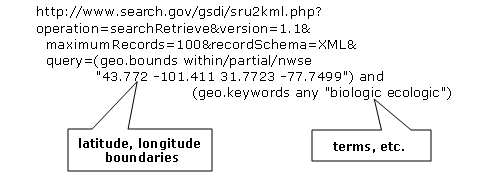| PROGRAMMES > WWW > WIS >
| Discovery Access and Retrieval (DAR) |
| |
Software that implements WIS has various requirements depending on the type of WIS Centre wherein it operates. For instance, the overall system as implemented at a GISC must deliver the data, products, and metadata intended for global distribution to authorized end-users and to other GISCs, in conformance with the WIS Compliance Specifications.
Given that GISCs must maintain data for at least 24 hours worth of data agreed for global exchange, the system must provide for managing the cached data such that the cache at all GISCs is the same to within limits that are determined by the type of information. For instance, one minute for warnings, 10 minutes for operational data, and so on. It is proposed that each GISC would be responsible for co-ordinating a WIS telecommunications infrastructure with the WIS Centres within its area of responsibility. That telecommunications infrastructure would have to meet WIS requirements for information exchange within the area, and be able to exchange agreed WIS time critical and operation critical information with other areas.
GISC's are required also to implement the Discovery Access and Retrieve (DAR) catalogue, which provides a means for locating and retrieving data and products throughout WIS. The DAR catalogue must expose a standard search interface for the discovery of resource information from diverse sources, using the international standard ISO 23950.
Because DAR metadata must be homogeneous in form and in content, ISO 19115 and ISO 19139 are to be used for the description of discovery metadata. Metadata for any data or product available from a DCPC or GISC is to be created or updated in the DAR Catalogue of the DCPC or GISC, before the data or product is available. Metadata could be:
- Sent as a metadata file via WIS to a GISC prior to publishing the data or product,
- Collected from the data / product producer (batch mode),
- Manually edited and validated via a web based interface provided by the system,
- Automatically generated from existing reference catalogues,
- Possibly built on the fly during the data ingestion.
|
DCPCs and NCs can also provide DAR services. Such services will play an important role in allowing users to retrieve the information that they discover via the GISC DAR service. Also, the DCPCs and NCs can raise the profile of their own services by registering the availability of information from their services in the GISC DAR catalogue.
Metadata concerning the delivery details of subscriptions to data and products from a DCPC or GISC are to be created or updated as well. For current MSS, the dissemination metadata is in the form of routing tables. These will need to be updated to allow for subscription and ad hoc requests. DCPCs and NCs must ensure that such "dissemination metadata" is created for all of their data and products, and that those metadata are kept up to date. Relevant international standards in this area include the regulations of WMO, current practices in stakeholder communities, among others.
Any instance of software implementing WIS will have to interface to a variety of existing interfaces at the various WIS Centres. These existing interfaces support a variety of functions, including monitoring, management and dissemination. Some will be used by internal users and some by authenticated external users. Accordingly, the system will need to provide user interfaces as well as inter-system interfaces for functions ranging from reporting to monitoring and controlling data flows, service levels, and system performance. Most importantly, the systems must provide robust mechanisms to assure high availability and appropriate recovery in the event of various types of failure.
|
 |
| Example: Standardized Interface -
Information Search and Retrieval (ISO 23950) |
|
| |
In this particular interface specification, WIS adopts an existing international standard, ISO 23950. This is the standard used by libraries worldwide for searching online catalogs, and it also used for searching geospatial metadata.
The ISO 23950 Information Search and Retrieval standard defines how to specify searches precisely, when you need accurate results. This includes latitude and longitude boundaries and scientific terms, as well as bibliographic citations.
Of course, this standard can be used simply with Internet search engines. But it has the expressive power for complex data searches such as chemical formulas and the pattern-matching needed for images.
|
 |
|
|
|
|
|
|

